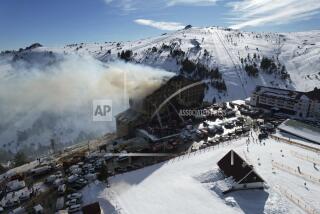Blasts Also Shattered Illusions
- Share via
BAGHDAD — The gardener was sipping his morning tea and preparing to bite into his breakfast of cheese and jam when the first blast struck. “Get out of the house!” he screamed to his wife as he put down his glass.
Then the second blast came, even stronger than the first.
Later, Mohammed Ali, 30, realized that if they had made it outside, they would have been killed as a pickup truck loaded with explosives-filled barrels detonated against the 12-foot concrete blast walls surrounding the Hamra Hotel, home to foreign journalists and several companies.
Outside the merchant’s house in the Jadiriya neighborhood of south Baghdad, where Ali and his wife live as caretakers, all was chaos: fire, collapsed walls, body parts, broken glass, fronts of buildings ripped off. Eight people were killed and about 20 were wounded in Friday morning’s blast.
“I always felt the hotel was well protected,” Ali said. “There are many guards and concrete blocks.... It is well fortified.”
But safety is an illusion in Baghdad. Inhabitants of the Hamra always felt that the location of the building, set back amid narrow residential streets, gave the family-run hotel a kind of temporary immunity, at least relative to the city’s larger, more iconic edifices.
The blasts shook the Hamra tower with a rumble and roar. Window glass sprayed across the floor. Ceiling tiles fell, as did heavy chunks of plaster. Dust formed a haze in the morning light.
People scrambled down the stairs, slipping on debris. Some were bleeding from minor wounds. In the lobby, a glass wall was gone, exposing the building to the elements. Their Kalashnikov assault rifles at the ready, guards raced about, shouting frantic commands.
The attackers’ tactics appeared similar to those used Oct. 24 in an attempted bombing of the Palestine Hotel complex, also home to many foreigners working in Iraq.
A colonel in the Iraqi police, who would not give his name, described what happened: A light-colored van pulled up along the blast wall and blew up after a few seconds. Like a battering ram, the explosion pushed aside some of the sections that form the Hamra’s main line of defense. It was quickly followed by a pickup truck loaded with what looked like water barrels. Guards shot at the second truck, but it did not stop.
The police official said speculation that the attack was meant for a nearby building, a low-slung bunker at the center of a controversy about police abuse of detainees, was false. If true, the attackers would have turned in that direction 200 yards earlier, he said.
Tarraq Jabbar, 20, was working about a mile away, but he felt the blasts. He hurried to his brother’s tiny hut near the Hamra after getting a call from his nephew Ahmed, a slight boy with a quick smile who works for tips watching hotel guests’ cars.
“I found the hut devastated,” he wailed. “I started crying and beating myself. I thought nobody could be alive.
“Thanks be to God, we found them all,” he said. Eight family members had cuts and broken bones, but they survived. “We will rebuild their hut,” he said. “They have no place else to go.
“Wicked people,” he said of the suicide attackers. “What excuse can they make?”
Haider Kadhim Abood, 35, stood dazed in front of his brother’s house, only 10 feet from the center of the blasts. His brother, Ahmed, was injured and had been taken to the hospital. But Ahmed’s daughter-in-law, Zehra, who had gone out to buy breakfast for the family, and his granddaughter, Russel Yasser, 8, who was on her way to school, were killed.
In addition, Ahmed’s son Ali, 18, who worked in the Hamra as a baker’s helper, was probably dead. The young man’s body was not found, but film shot by a security camera indicated that he was present when the blast occurred.
Haider said his brother had thought about selling his house but had not done so.
“Now who is going to compensate these poor people?” he asked. “Where is there to go to be safe?”
Abood Tuma, 46, a government worker, stood nearby, his right eye covered with a bloody bandage. Friends and relatives were congratulating him for not getting killed, but he was still thinking about how he had fought his way out of bed through a cloud of dust and debris, calling to his children in desperation.
“Thank God, nobody from my family was hurt.... But we are sad for what happened to others,” he said. “If we are not feeling safe in our own house, where then should we go?”
Times staff writer Solomon Moore contributed to this report.
More to Read
Sign up for Essential California
The most important California stories and recommendations in your inbox every morning.
You may occasionally receive promotional content from the Los Angeles Times.













